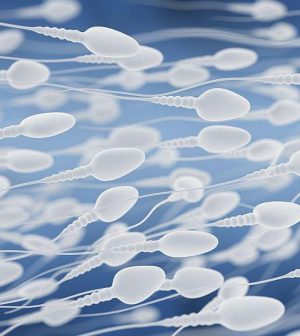- Could Your Grocery Store Meat Be Causing Recurring UTIs?
- Are You Making This Expensive Thermostat Error This Winter?
- Recognizing the Signs of Hypothyroidism
- 10 Strategies to Overcome Insomnia
- Could Artificial Sweeteners Be Aging the Brain Faster?
- Techniques for Soothing Your Nervous System
- Does the Water in Your House Smell Funny? Here’s Why
- Can a Daily Dose of Apple Cider Vinegar Actually Aid Weight Loss?
- 6 Health Beverages That Can Actually Spike Your Blood Sugar
- Treatment Options for Social Anxiety Disorder
Families of Infertile Men Face Higher Cancer Risks

A deficiency or absence of viable sperm in a man’s semen could spell danger for him and those closely related to him, new research suggests.
Cancers are more likely to occur in these men and their families, reports a team led by Dr. Joemy Ramsay, an assistant professor at Utah University in Salt Lake City.
The exact link between cancer risk and male infertility isn’t yet clear, but “by identifying families with similar patterns of cancer, we may be able to discover factors that are involved in both infertility and cancer,” Ramsay said.
The findings were published Feb. 21 in the journal Human Reproduction.
As the Utah team pointed out, prior studies have noted links between reduced sperm in men and familial cancer risk. But the magnitude of the effect hadn’t been studied.
In this latest research, Ramsay’s group gathered the results of semen sample analyses from close to 800 Utah men who were visiting fertility clinics, and compared those findings to samples from almost 5,700 men known to be fertile (they’d fathered at least one child).
Of the infertile men, 426 had no sperm in their semen, while another 360 have only very small levels of sperm.
Ramsay and her colleagues then retrieved stats on any history of cancer among the full group of men and their families.
Among men with no sperm in their semen, 12 of 13 of the men’s respective families had higher rates for at least one type cancer. The results were similar for men who had very small amounts of sperm in their semen: All 12 of the families linked to these men had higher cancer rates, the study found.
Family members of men with no sperm in their semen had a 156% higher risk of bone and joint cancers; a 56% higher odds for sarcomas and other soft tissue tumors; a 27% higher risk for uterine cancer; a 60% higher odds for Hodgkin lymphoma and a 54% higher odds for thyroid tumors.
Family members of men with minimal amounts of sperm in their semen faced similar odds: A 143% increase in bone and joint cancers, a 16% higher odds for colon cancer and a 134% higher risk for testicular cancer, the researchers found.
There was one outlier among this group: A 61% lower risk for esophageal cancers, according to the Utah team.
Risks ranged widely between families, the researchers noted. For example, among men with low sperm counts the risk for testicular cancer ranged from four- to 24-fold, depending on family cluster.
“Our study identified several unique patterns of cancer risk in families of men with poor fertility,” Ramsay said in a journal news release. “When family members share cancer risk patterns, it suggests that they have genetic, environmental or health behaviors in common. Genetic and environmental exposures can also act together to increase cancer risk.”
Further research is planned, and Ramsay said new insights may “help us to assess the risk of cancer for families and provide improved patient counseling.”
More information
There’s more on male infertility at Johns Hopkins Medicine.
SOURCE: Human Reproduction, news release, Feb. 21, 2024
Source: HealthDay
Copyright © 2026 HealthDay. All rights reserved.










